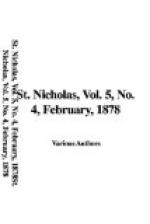“No, miss, I never went to school.”
“That is not taught there. I’ll bring you a book all about it when I come back. Mr. Gulliver went to the horse-country and heard the dear things speak their own tongue.”
“My father has been on the prairies where there’s lots of wild ones, but he didn’t hear ’em speak. I know what they want without talkin’,” answered Ben, suspecting a joke, but not exactly seeing what it was.
“I don’t doubt it, but I wont forget the book. Good-by, my lad, we shall soon meet again,” and away went Miss Celia as if she was in a hurry to get back.
“If she only had a red habit and a streamin’ white feather, she’d look as fine as Melia used to. She is ’most as kind and rides ’most as well. Wonder where she’s goin’ to. Hope she will come soon,” thought Ben, watching till the last flutter of the blue habit vanished round the corner, and then he went back to his work with his head full of the promised book, pausing now and then to chink the two silver halves and the new quarter together in his pocket, wondering what he should buy with this vast sum.
Bab and Betty meantime had had a most exciting day, for when they went home at noon they found the pretty lady there, and she had talked to them like an old friend, given them a ride on the little horse, and kissed them both good-by when they went back to school. In the afternoon the lady was gone, the old house all open, and their mother sweeping, dusting, airing in great spirits. So they had a splendid frolic tumbling on feather beds, beating bits of carpet, opening closets, and racing from garret to cellar like a pair of distracted kittens.
Here Ben found them, and was at once overwhelmed with a burst of news which excited him as much as it did them. Miss Celia owned the house, was coming to live there, and things were to be made ready as soon as possible. All thought the prospect a charming one; Mrs. Moss because life had been dull for her during the year she had taken charge of the old house; the little girls had heard rumors of various pets who were coming, and Ben, learning that a boy and a donkey were among them, resolved that nothing but the arrival of his father should tear him from this now deeply interesting spot.
“I’m in such a hurry to see the peacocks and hear them scream. She said they did, and that we’d laugh when old Jack brayed,” cried Bab, hopping about on one foot to work off her impatience.
“Is a faytun a kind of a bird? I heard her say she could keep it in the coach-house,” asked Betty, inquiringly.
“It’s a little carriage,” and Ben rolled in the grass, much tickled at poor Betty’s ignorance.
“Of course it is. I looked it out in the dic., and you mustn’t call it a payton though it is spelt with a p,” added Bab, who liked to lay down the law on all occasions, and did not mention that she had looked vainly among the f’s till a school-mate set her right.




